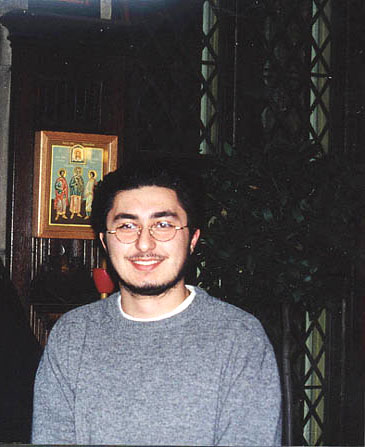October 26—Monday
We all stayed at the apartment all morning, as a few people wanted to come and speak to Metropolitan before he left. A few people kept coming by to drop off gifts for us and other things to take back to America (letters, small gifts, etc.). Fr. Otari came around noon with his wife and his son Luka. We had arranged earlier with the Metropolitan for them to come so he could read a prayer for the sick over Fr. Otari’s wife. We chanted a few dismissal hymns and he read the prayers. Then Fr. Otari took them and dropped them off somewhere to take the city transportation home. He returned and took me to Metekhi, as I still had not venerated St. Susanna’s tomb. When we got there and went up to the church, we saw a bishop and a priest right inside the door. We decided not to go in right away, and so walked around outside for a bit. Then we went in, and the priest was serving a memorial service for someone. We went through to the other side and up to the little room on the right side of the church next to the sanctuary where the tomb is. It is a very nice little compunctionate room with the tomb of white stone with something inscribed on the front in Georgian. I venerated it then took a short video. Fr. Otari was obviously a little nervous about remaining inside for long, as he (as with all the other clergy as well) did not want to have any unpleasant encounters with the patriarchate clergy.
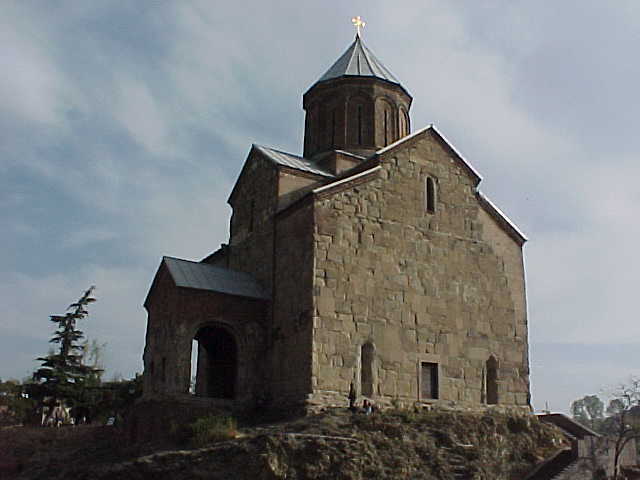
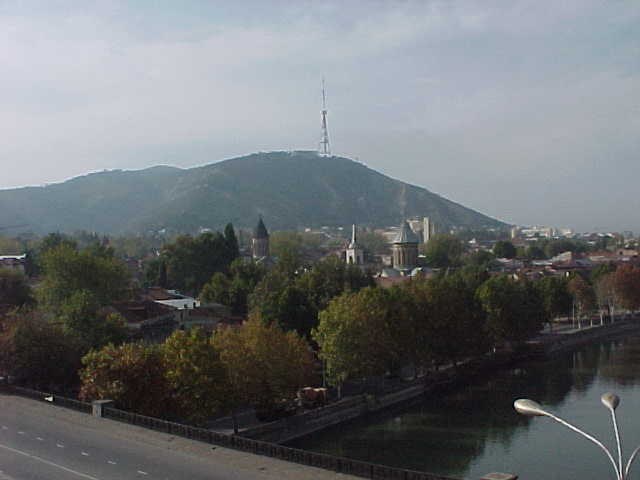
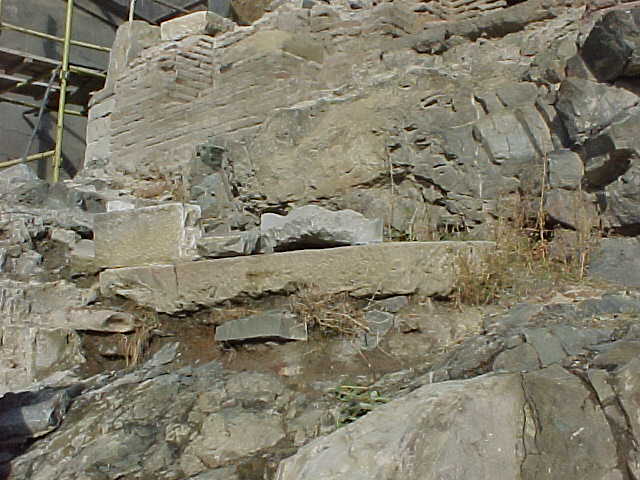
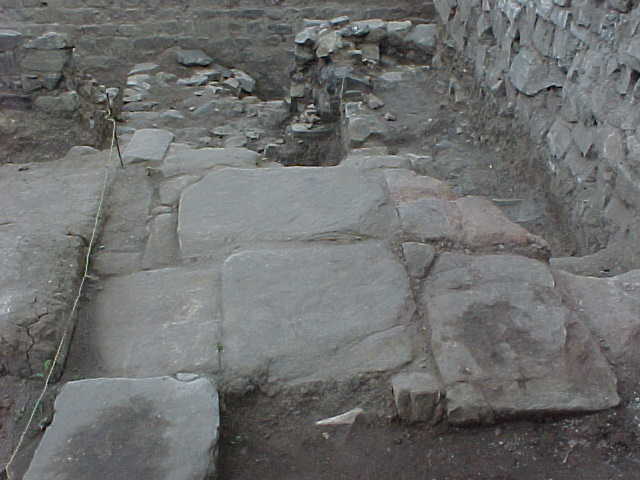
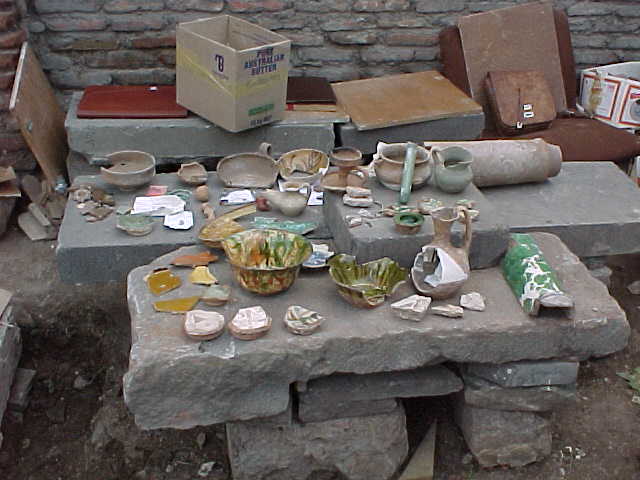
We then drove down the mountain and around a little more, Fr. Otari pointing out a few other places of interest, and then we returned to the apartment.
Fr. Otari, fortunately had the thought to check with the airlines about the time of our departure the next day, because the Sunday before, we went off of daylight savings time, and he recalled an incident where someone had found out in time that the departure time was not the same as the ticket said. So, he called from our apartment, and sure enough, our plane was leaving an hour earlier (10:50 a.m. instead of 11:50).
The chanters from church came by with little gifts for all of us and to say good-bye. While they were there, the electricity went off, and we were left in the dark with our flashlights. But it went back on in less than half an hour.
Fr. Otari stayed for a little while, then left, as I had to finish packing. My bag, which I had just bought before I went to Georgia, had begun ripping (we really got "ripped" on that one!), and it was obvious it would be risky to check it on the airplane like that. So, I took all the vestments we had brought out of the box they had been in, and used that box to put my bag in. I sat till well past midnight all by myself fixing this box, and then retired.
October 27—Tuesday—Departure
The clergy began showing up between 8:00 and 8:30. Teimuraz (the one who speaks English) brought his van and we loaded up our baggage. He also took all the boxes with the clothing for the parishioners. We left at about 8:30 with Fr. Zurab (Fr. George was not able to come and had bid farewell with us the day before) and arrived at the airport at about 9:00 or so. Fr. John the Archiman-drite was there with Fr. Gabriel, Mother Sidonia, and Fr. Gelasi. Fr. Otari came in his own car and helped us get our things to the check-out counter. Everything went through all right and we all went up to the second floor to go through security. There we bade farewell with everyone. They were all sad to see us go, and we were sad to leave them. Fr. Otari and one other (I think it was Teimuraz) got permission to go beyond security to help us with our carry-ons. Meanwhile, the Metropolitan was handing out icons and I was handing out crosses to the personnel. When we got situated at the seats we were going to sit and wait at, we bade farewell to Teimuraz and Fr. Otari, whom we were particu-larly sad to leave, as he had become like a member of our family.
As we were waiting for our departure, word was getting around that icons and crosses were being handed out, and people kept on coming about every five minutes. We literally got down to the bottom of our stack of icons when they finally stopped coming. We handed out all our gold and rhodium plated crosses. At one point the Metropolitan remembered that they had forgotten to present their frequent flyer cards and asked me to see if I would be allowed to go down and have them recorded. One of the men at security very kindly accompanied me down and back.
We started boarding on time, but we sat on the plane and were a little late in leaving, because many people did not know of the change of flight time. We were told that between Tbilisi and London the wind was blowing very strongly and that would slow us down. We took off, and the sight we saw was very beautiful as we flew across Georgia, looking down at all the mountains.
There was a bit of turbulence, but nothing really very disturbing. We arrived in London with rather strong winds, and the pilot did a marvellous job of setting us down despite the winds. I was getting nervous at all the delay, because I had arranged with Otari Babunashvili, one of our parishioners from Tbilisi, who is studying in England (I had been corresponding with him for over year by e-mail, and Fr. Isaac met him on a trip to England at the beginning of the year), to meet us at the airport, as we originally were supposed to have a three-hour layover there. When we finally got off the plane, I went straight for the lobby, while the Metropolitan and Fr. Andrew went to the place where they would wait for the next flight. I had to go through passport control and customs, and Otari was waiting there for me. We went and sat down and had a nice talk and then decided to go upstairs to see where I would have to go to get back in the area for departures. Then I had realized that I had forgotten a couple of letters Dr. Kakha had asked me to mail from England. I had wanted to give them to Otari to mail. So, I went back in, promising to come back out with the letters, which I did. I brought the Metropolitan with me, as we still had a little time, and we chatted with him some more. Finally, we had to leave him. He was very happy to have seen us in person finally.
Thus ended our visit to Georgia. Glory be to God for all things!
